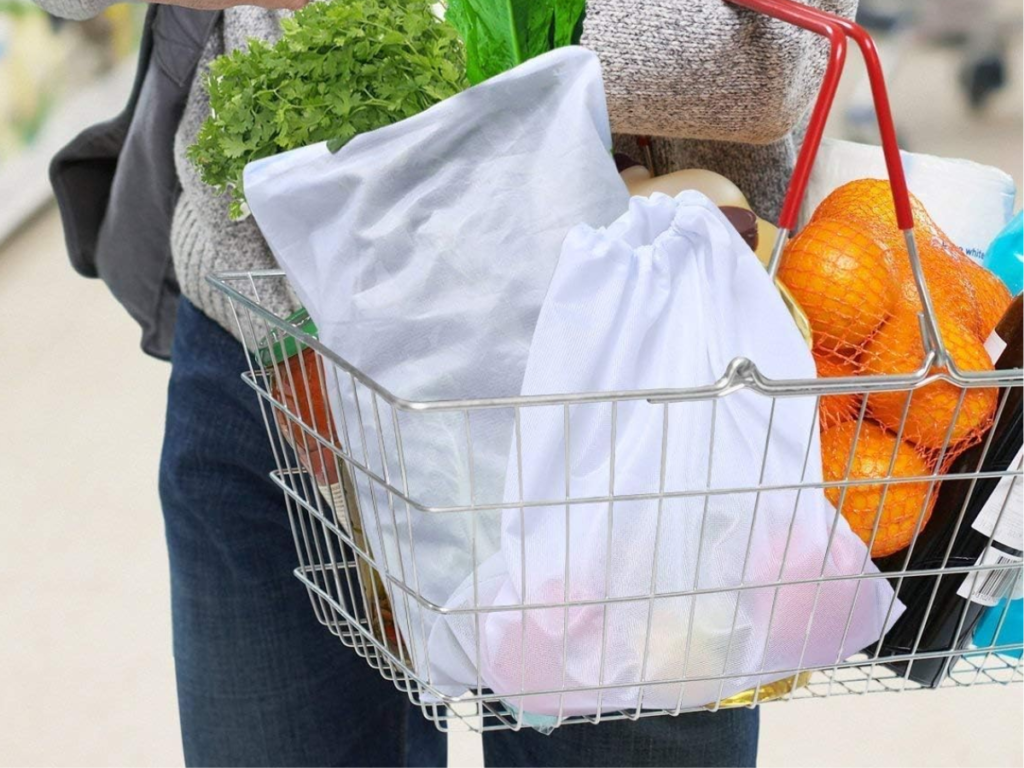Choosing between reusable mesh bags and plastic grocery bags can be an easy decision to make unless you consider several important factors.
Sure. Both serve the purpose of carrying groceries, but they are different when it comes to durability, eco-friendliness, versatility, load capacity, and cost.
So, which one is better for your needs?
Read on to find out the key differences between reusable mesh bags and plastic grocery bags so that you can choose the right option.
What are Reusable Mesh Bags?
Generally made from materials like polyester, cotton, or nylon, reusable mesh bags are available in various sizes. They are washable, durable, and can be used several times.
The mesh design allows for breathability and visibility of the contents inside the bag. This way, it makes them convenient for grocery shopping. These bags often feature drawstring closures or handles for easy carrying.
What are Plastic Grocery Bags?
Plastic grocery bags, on the other hand, are single-use bags typically made from polyethylene, a type of plastic derived from fossil fuels such as petroleum. They are lightweight, cheap to produce, and widely used by grocery stores around the world.
What are the Advantages of Reusable Mesh Bags?
Environmental Friendliness:
Reusable mesh bags are typically made from sustainable materials such as cotton, polyester, or nylon. Therefore, they lead to lower waste and environmental pollution when compared to their plastic counterpart.
Durability:
When it comes to durability, mesh bags have an edge over plastic bags. Mesh bags can withstand multiple uses without breaking or tearing. This means that they can be reused many times, making them a cost-effective option.
Breathability:
The mesh design allows for the circulation of airflow. And this is quite beneficial when it comes to storing fresh produce. This feature improves the shelf life of fruits and veggies. Plastic bags, on the other hand, are likely to trap moisture, leading to premature spoiling of the content they hold.
Versatility:
Reusable mesh bags come in various sizes and shapes, suitable for different types of groceries. They can also be used for purposes other than grocery shopping, such as organizing items in the pantry or carrying laundry.
Easy to Clean:
Another benefit is that most reusable mesh bags can be washed, making them convenient to clean and maintain hygiene.
What are the Disadvantages of Reusable Mesh Bags?
Initial Cost:
Although reusable mesh bags prove cost-effective in the long run, they can have a higher upfront cost.
Limited Load Capacity:
Mesh bags may not be as strong as plastic bags and may have lower load-bearing capacity. Therefore, they can be torn or damaged in case they hold heavier items than their capacity.
Transparency:
Unlike plastic bags, mesh bags are not transparent, which can make it difficult to identify items stored inside without opening them. This could lead to inconvenience during grocery shopping or storage.
What are the Advantages of Plastic Grocery Bags?
Convenience:
Plastic grocery bags are lightweight and readily available at most stores, making them convenient for carrying groceries home. You can store them easily as well as dispose of them after use.
Transparency:
Plastic bags are transparent, so you can easily identify the contents without having to open them.
This can be particularly helpful when sorting groceries or storing items in the refrigerator.
Waterproof:
Plastic bags protect against moisture, which is beneficial for storing wet or leaky items such as meat or dairy products.
Low Cost:
The low cost of production of plastic bags is one factor in their widespread use and availability. Many customers find them to be a preferred option because of their price.
What are the Disadvantages of Plastic Bags?
Environmental Impact:
The low cost of production of plastic bags is one factor in their widespread use and availability. Many customers find them to be a preferred option because of their price.
Single-Use:
Due to their single-use nature and frequent discarding after only a single use, plastic shopping bags generate a significant quantity of garbage.
Lack of Durability:
Plastic bags are easily torn or broken, especially when stuffed full of large objects.
This can result in spills or damage to groceries, leading to inconvenience for the user.
Non-Breathable:
Plastic bags do not allow for airflow, which can accelerate the spoilage of fresh produce by trapping moisture inside.
How to Choose the Right One for Your Needs?
Environmental Impact:
If reducing your carbon footprint and minimizing plastic waste are important to you, reusable mesh bags are the better option. They support a more sustainable way of living by lowering the usage of single-use plastics.
Durability and Longevity:
Consider how often you plan to use the bags and the types of items you typically purchase. Reusable mesh bags are often more robust and long-lasting, which makes them an economical choice over time.
Plastic bags, on the other hand, are designed for single use and may tear or break easily, requiring frequent replacements.
Convenience:
Plastic grocery bags are lightweight and readily available at most stores, making them convenient for spontaneous shopping trips. However, reusable mesh bags can also be convenient if you make it a habit to carry them with you when grocery shopping.
Load Capacity:
Consider the weight and volume of the items you typically purchase. Plastic bags may have a higher load-bearing capacity compared to mesh bags, but overloading them can lead to tearing or breakage. If you frequently buy heavy or bulky items, opt for reusable mesh bags with reinforced stitching and sturdy handles.
Versatility:
Think about how you can use the bags beyond grocery shopping. Reusable mesh bags are multipurpose and can be used as beach totes, gym clothes carriers, or even organization at home.
Plastic bags have limited uses and are not suitable for heavy or sharp objects due to their low durability.
Cost:
While reusable mesh bags may have a higher upfront cost than plastic bags, they offer better value for money in the long term due to their durability and reusability.
To find the solution that best suits your needs in terms of cost, calculate the cost per use.
The Verdict:
While plastic grocery bags offer convenience and affordability, they come with significant environmental drawbacks. Reusable mesh bags, on the other hand, are more sustainable and durable options, albeit with slightly higher upfront costs.
Ultimately, the choice between the two depends on individual preferences, considering factors such as environmental impact, convenience, and budget.





